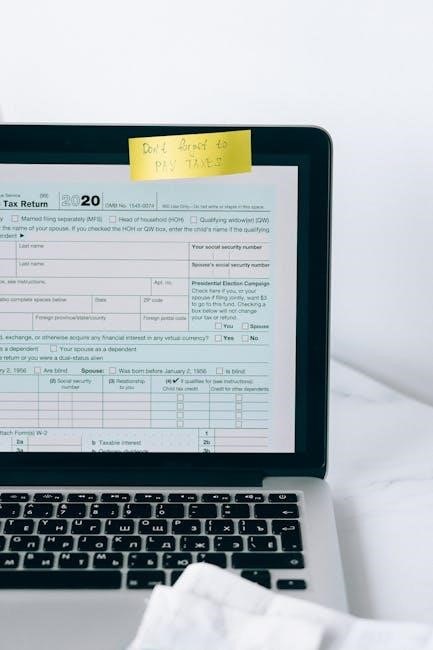children’s services award pay guide 2023
The 2023 Children’s Services Award Pay Guide outlines minimum wages, work hours, and leave entitlements for employees in the children’s services sector, ensuring fair and updated workplace conditions.

Key Elements of the Children’s Services Award
The Children’s Services Award outlines key elements such as employee classifications, work-related allowances, and compliance requirements, ensuring fair workplace conditions and up-to-date employment standards for all staff.
Minimum Wage Rates
The Children’s Services Award 2023 sets minimum wage rates for employees, with increases applied to ensure fair compensation; A 5.75% rise was implemented, effective from July 1, 2023, reflecting current economic conditions. Rates vary by employee levels, with specific weekly and hourly figures outlined for full-time, part-time, and casual workers. These rates are structured to reflect qualifications, experience, and responsibilities, ensuring equitable pay across the children’s services sector. Detailed wage tables are provided in the official pay guide for reference.
Work Hours and Schedules
The Children’s Services Award 2023 regulates work hours, with a standard 38-hour workweek for full-time employees. Part-time and casual workers have hours set by agreement. Employees are entitled to regular breaks, including meal and rest periods. Rostering must be fair and transparent, with advance notice for shift changes. Flexibility is allowed to meet service needs, but work schedules must comply with the Award’s provisions to ensure work-life balance and employee well-being. Specific rules apply to overtime and shift variations.
Leave Entitlements and Benefits
The 2023 Children’s Services Award ensures employees receive comprehensive leave entitlements, including annual leave, sick leave, and public holidays. Annual leave is accrued at 4 weeks per year, with an additional loading for full-time and part-time employees. Sick leave allows for 10 days per year, and public holidays are paid if rostered. Additional benefits include compassionate leave and family and domestic violence leave, ensuring employees’ personal and family needs are supported without loss of pay or leave entitlements.

Employee Classifications Under the Award
Employees are classified into four levels based on roles, qualifications, and responsibilities, ensuring fair pay and career progression within the children’s services sector.
Children’s Services Employee Level 1
Children’s Services Employee Level 1 is an entry-level role, typically involving assisting in daily activities, supporting educators, and maintaining a safe environment for children. This level requires a Certificate III in Early Childhood Education or equivalent. The pay rate for Level 1 employees is set at $24.84 per hour for full-time, $27.32 per hour for part-time, and $2.48 per hour casual loading, as per the 2023 pay guide updates.
Children’s Services Employee Level 2
Children’s Services Employee Level 2 involves responsibilities such as planning and implementing activities for children, supervising other staff, and maintaining a safe and engaging environment. This level typically requires a Certificate III in Early Childhood Education. The pay rate for Level 2 employees is $25.66 per hour for full-time, $28.23 per hour for part-time, and $2.57 per hour casual loading, reflecting a progression from Level 1.
Children’s Services Employee Level 3
Children’s Services Employee Level 3 roles involve advanced responsibilities, including curriculum development, leading teams, and mentoring staff. This level typically requires a Diploma in Early Childhood Education. The pay rate for Level 3 employees is $26.50 per hour for full-time, $29.33 per hour for part-time, and $2.68 per hour casual loading. These rates reflect the higher skill and responsibility expectations compared to Level 2, ensuring fair compensation for their critical role in early childhood education.
Children’s Services Employee Level 4
Children’s Services Employee Level 4 represents the highest classification, often involving significant leadership roles such as centre management. These employees typically hold an Advanced Diploma or Bachelor’s degree. The pay rate for Level 4 is $28.00 per hour for full-time, $31.10 per hour for part-time, and $2.80 per hour casual loading. This level demands advanced skills in operational management, educational leadership, and staff supervision, ensuring they are adequately compensated for their expertise and responsibilities.

Pay Rates for Different Employment Types
Different employment types under the Children’s Services Award include full-time, part-time, and casual roles, each with specific pay rates and conditions to ensure fair compensation.
Full-Time Employees
Full-time employees under the Children’s Services Award are entitled to a standard 38-hour workweek, with set minimum weekly rates based on their classification level. These rates are adjusted annually to reflect Fair Work Commission updates, ensuring fair compensation. Full-time employees also receive benefits like annual leave, sick leave, and public holiday pay, aligning with the award’s provisions to provide a stable and secure employment structure.
Part-Time Employees
Part-time employees under the Children’s Services Award are paid at the same hourly rate as full-time employees but for fewer hours. Their weekly hours are agreed upon in writing, with a minimum engagement period. Part-time workers receive proportional entitlements to annual leave, sick leave, and public holidays. Their pay rates are adjusted annually, reflecting Fair Work Commission updates, ensuring fair compensation for their work. This arrangement offers flexibility while maintaining employment security and benefits.
Casual Employees
Casual employees under the Children’s Services Award receive a higher hourly rate compared to full-time or part-time workers, with a 25% loading to compensate for lack of leave entitlements. They are entitled to minimum engagement periods and have the right to request conversion to permanent employment after a certain period. Casual workers also qualify for overtime rates for hours worked beyond ordinary shifts. This structure provides flexibility for employers while ensuring fair compensation for casual staff.
Work-Related Allowances
The Children’s Services Award includes allowances for meals, travel, and specific work-related expenses, ensuring employees are reimbursed for costs incurred while performing their duties.
Meal Allowances
Meal allowances under the Children’s Services Award are provided to employees who incur meal expenses due to work-related requirements. The allowance rate is specified in the award and is updated annually. As of the 2023 pay guide, meal allowances are set at a fixed rate per meal, ensuring employees are reimbursed for out-of-pocket expenses. This provision aims to support staff who work extended hours or are required to travel for their roles. The exact rate is detailed in the official pay guide to ensure compliance with current regulations.
Travel Allowances
Travel allowances under the Children’s Services Award are designed to reimburse employees for work-related travel expenses. These allowances cover costs such as fuel, tolls, and parking. As of the 2023 pay guide, travel allowances are updated to reflect current rates, ensuring employees are fairly compensated for travel incurred while performing their duties. Employers are required to adhere to these rates, which are detailed in the official pay guide to maintain compliance with the Fair Work Commission’s regulations.

Leave Entitlements
Leave entitlements under the 2023 Children’s Services Award include annual leave, sick leave, and public holidays, ensuring employees receive fair and competitive time-off benefits aligned with Fair Work standards.
Annual Leave
Annual leave entitlements under the Children’s Services Award provide employees with a minimum of four weeks’ paid leave per year. This allows staff to rest and recharge, promoting work-life balance. The leave accrues progressively and can be taken at agreed times. Employees are also entitled to annual leave loading, typically 17.5% of their base pay, ensuring additional compensation during their break. These provisions aim to support employee well-being and align with Fair Work standards for fair compensation.
Sick Leave
Under the Children’s Services Award, employees are entitled to 10 days of paid sick leave per year. This leave can be used for personal illness or caring for immediate family members. Sick leave is accrued progressively and can be accessed when needed; Employees must provide evidence of illness if required by their employer. The leave is paid at the employee’s base rate of pay, ensuring financial support during health-related absences. This provision supports work-life balance and employee well-being.
Public Holidays
Employees under the Children’s Services Award are entitled to paid public holidays, ensuring time for rest and leisure. Payment is made at the employee’s base rate of pay. If an employee works on a public holiday, they may receive penalty rates or an additional day off in lieu. The Award also accounts for regional public holidays, ensuring consistency across locations. This provision aligns with the Award’s commitment to fair compensation and work-life balance.

Work Hours and Rostering
The Award regulates work hours, ensuring fair rostering practices, with a maximum of 38 hours per week. Employees receive notice of shifts, avoiding excessive consecutive shifts.
Ordinary Hours of Work
Ordinary hours for children’s services employees are typically 38 hours per week, spread over five days. Shifts usually occur between 6 AM and 6 PM, aligning with service operations. Employees are entitled to regular breaks, with at least 10 hours of rest between shifts. Penalty rates apply for work on weekends or public holidays. These standards ensure a balanced workload and fair compensation, reflecting the demands of the sector while protecting employee well-being.
Overtime Rates
Overtime rates apply when employees work beyond their ordinary hours. For the first two hours of overtime, the rate is 1.5 times the standard pay. After two hours, it increases to double the standard rate. Overtime is typically paid for work on weekends, public holidays, or after 12 hours in a single shift. These provisions ensure fair compensation for extended work periods, reflecting the demands of the children’s services sector while safeguarding employee rights and well-being.
Rostering Arrangements
Rostering arrangements under the 2023 Children’s Services Award ensure employees receive fair and predictable schedules. Employers must provide rosters at least two weeks in advance, with part-time employees entitled to a minimum of 8 hours’ notice for any roster change. Casual employees must have their shifts confirmed at least one day before. These measures promote work-life balance and provide stability, ensuring employees can plan their personal and professional commitments without undue disruption or uncertainty.

Fair Work Commission Updates
The Fair Work Commission regularly reviews and updates the Children’s Services Award to ensure fair wages and conditions, incorporating changes like the 5.75% increase in work-related allowances.
Recent Changes to the Award
Recent updates to the Children’s Services Award include a 5.75% increase in work-related allowances and adjustments to minimum wage rates, effective from July 2023. These changes reflect the Fair Work Commission’s commitment to fair pay and updated workplace conditions. The Commission also reviewed classification structures to ensure they align with current industry standards. Employers must adhere to these revisions to maintain compliance, with specific updates outlined in the 2023 pay guide to support accurate implementation and employee entitlements.
Future Reviews and Amendments
The Fair Work Commission plans to review the Children’s Services Award in mid-2025, focusing on classification structures and pay rates. These reviews aim to align the award with current industry standards and ensure equitable pay practices. Employers are advised to monitor updates closely to comply with any new changes. Future amendments will prioritize clarity and transparency, ensuring the award remains relevant to the evolving needs of the children’s services sector.
Accessing the Pay Guide
The Children’s Services Award Pay Guide 2023 is accessible via the Fair Work Ombudsman’s website, offering detailed wage rates, allowances, and calculation tools for employees.
Official Resources
Official resources for the Children’s Services Award Pay Guide 2023 include the Fair Work Ombudsman’s website, which provides accurate and up-to-date information. The Fair Work Ombudsman ensures the guide is accessible, offering detailed pay rates, allowances, and conditions. Additionally, the Fair Work Commission website contains the full text of the award, including recent updates and amendments. These resources are updated annually to reflect changes in minimum wages and employment conditions, ensuring compliance and fairness for all employees in the children’s services sector.
Tools for Calculating Pay
Tools for calculating pay under the Children’s Services Award Pay Guide 2023 include the Fair Work Ombudsman’s Pay Guide tool, which provides interactive calculators for determining wages, allowances, and leave entitlements. This tool is designed to simplify compliance with the award’s requirements, ensuring accurate calculations for full-time, part-time, and casual employees. Employers and employees can access this resource online, making it easier to understand and apply the pay rates outlined in the award effectively.

Understanding Your Pay
Understanding your pay involves knowing your base salary, allowances, and benefits, all determined by your role, experience, and the Children’s Services Award 2023 guidelines.
How Pay Rates Are Determined
Pay rates under the Children’s Services Award 2023 are determined by an employee’s classification level, experience, and hours worked. The Fair Work Commission sets minimum wages annually, considering economic conditions and industry standards. Employees are grouped into levels based on their roles and responsibilities, with higher levels receiving increased pay. Allowances and overtime rates further adjust total remuneration, ensuring fair compensation for all workers in the sector.
Calculating Your Total Remuneration
Your total remuneration under the Children’s Services Award 2023 includes base pay, allowances, and overtime. Base pay is determined by your classification level and hours worked, with casual employees receiving a higher rate. Allowances, such as meal or travel allowances, are added to your base pay. Overtime rates apply for hours worked beyond standard shifts. Employers must also factor in any agreed penalties or loadings. Use the Fair Work Ombudsman’s pay guide tools to ensure accurate calculations.

Compliance and Obligations
Employers must adhere to the Children’s Services Award 2023, ensuring correct minimum wages, leave entitlements, and work hours. Accurate record-keeping is mandatory to avoid penalties.
Employer Responsibilities
Employers must ensure compliance with the Children’s Services Award 2023, including accurate record-keeping of wages, hours, and leave. They are responsible for paying correct minimum rates, managing leave entitlements, and ensuring safe workplaces. Employers must also notify employees of changes to rosters or conditions. Failure to meet these obligations can result in penalties. Adhering to Fair Work regulations and staying updated on Award changes is crucial for maintaining compliance and avoiding legal consequences.
Penalties for Non-Compliance
Employers who fail to comply with the Children’s Services Award 2023 may face penalties, including fines of up to $33,000 for individuals and $165,000 for businesses. Non-compliance with minimum wage rates, leave entitlements, or record-keeping requirements can result in legal action. The Fair Work Ombudsman actively enforces these standards, and breaches can lead to court-imposed penalties. Employers must stay informed about Award updates to avoid violations and ensure fair workplace practices.

Resources and Support
Official government sources like the Fair Work Ombudsman and Fair Work Commission provide detailed pay guides and support. Industry associations offer additional assistance and clarification on Award requirements.
Official Government Sources
The Fair Work Commission and Fair Work Ombudsman provide authoritative resources for the Children’s Services Award. Their websites offer detailed pay guides, updated wage rates, and compliance tools. The Fair Work Ombudsman ensures accurate information, while the Commission hosts official Award documents. These sources are essential for employers and employees seeking clarity on pay rates, leave entitlements, and workplace obligations under the 2023 Award.
Industry Associations and Unions
Industry associations and unions, such as the Australian Childcare Alliance and United Workers Union, provide valuable resources and support for employees and employers in the children’s services sector. They offer guidance on interpreting the Award, accessing pay guides, and understanding workplace rights. These organizations often advocate for fair wages and improved working conditions, ensuring compliance with the Children’s Services Award 2023. They also provide training and updates on Award changes, helping stakeholders navigate the complexities of the pay guide effectively.

